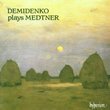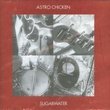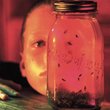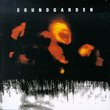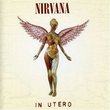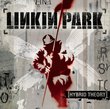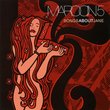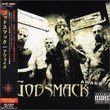| All Artists: Days of the New Title: Days of the New Members Wishing: 0 Total Copies: 15 Label: Fontana Geffen Original Release Date: 6/3/1997 Release Date: 6/3/1997 Genres: Alternative Rock, Pop, Rock, Metal Styles: American Alternative, Alternative Metal Number of Discs: 1 SwapaCD Credits: 1 UPCs: 607703000421, 0607703000421 |
Search - Days of the New :: Days of the New
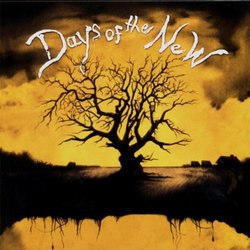 | Days of the New Days of the New Genres: Alternative Rock, Pop, Rock, Metal
![header=[] body=[This CD is available to be requested as disc only.]](/images/attributes/disc.png?v=15401716) ![header=[] body=[This CD is available to be requested with the disc and back insert.]](/images/attributes/disc_back.png?v=15401716) ![header=[] body=[This CD is available to be requested with the disc and front insert.]](/images/attributes/disc_front.png?v=15401716) ![header=[] body=[This CD is available to be requested with the disc, front and back inserts.]](/images/attributes/disc_front_back.png?v=15401716) |
Larger Image |
CD DetailsSimilar CDsSimilarly Requested CDs
|
CD ReviewsAcoustic Grunge? Hardly. Barry Dejasu | Rehoboth, Massachusetts | 12/15/2003 (5 out of 5 stars) "Days of the New's 1997 self-titled debut (and to many people's confusion, ALL their albums are self-titled, usually referred to by a sequential number) is an interesting blend of different styles of music, ranging from rock to folk, grunge to...country, I guess (I don't listen to country - nor do I hate it - but this is fairly close to it, I guess). Many people wrote the band off as an acoustic rip-off of such bands as Pearl Jam and Alice in Chains, but after having this album for about two years now, I have thoroughly determined that this is a false accusation.What we have here is the brainchild of singer/guitarist/songwriter Travis Meeks. At the time of this album's recording, he was only 17! His voice, a deep, droning croon that has often had comparisons (for good or for bad) to Eddie Vedder's, is expertly used for the best - his screams are scattered but effective. And good lord, LISTEN to him play guitar! Carefully picking and plucking his notes and chords, he set himself quite apart from the many post-grunge bands that lack any talent whatsoever (Puddle of What?). And his band is quite impressive, as well: Justin Whitener as the second guitarist is just as good as Meeks, not to mention a good backing vocalist. Jesse Vest is an okay bassist; nothing of a particular stand-out, but he keeps a good rhythm going, and can be complex at times. And then there's Matt Taul on drums. He is without a doubt an excellent drummer, with nice fills and creative, lyrical percussions that complement each song. It was due to the "grunge rip-off" comparisons that Travis Meeks would struggle to change the band's sound and explore new territories, and the rest of the band, not wanting their styles crimped, would quit. They later picked up singer Hugo Ferreira and formed the band Tantric, and utilized a much more electrified sound.Some songs, such as the leading single "Touch, Peel, and Stand" and its follow-up, "The Down Town" do share something of a "grungy" feel to them. I suppose if those songs were played using electric guitar with some level(s) of distortion, they COULD probably be considered at least some sort of post-grunge-era rock band. Other songs, such as "Shelf in the Room," "Solitude," and "What's Left for Me?" have more of a ballad-y feel, with a heavy folk influence. The album has a whole blend of musical styles, and it's ALL acoustic, even the solos and leads. My favorite solo: on "Now" - just listen as Meeks and Whitener alternate solos with ease. It's a great collection, and fairly long (not counting the two minutes of silence before the hidden instrumental at the end, the album is over an hour long!).And speaking of that extra track, we have a lush, springtime feel as we hear birds tweeting and wind blowing, thunder cracking in the sky, and a single acoustic guitar strumming and picking away beautifully. Then...the guitar stops, and we hear more of the wildlife. Shortly after, the guitar returns, plucking notes as a bongo (or similar drum) starts to pulse. Just listen to it. It's an excellent closing piece.So there it is in a nutshell: Days of the New is not just another post-grunge band. They are (or rather, Travis Meeks himself is) a musical phenomena that blends different styles and should be given their deserved credit as one of the more original and interesting of the '90's rock bands." Wow! Jimmy Page | Marietta, GA USA | 09/29/2005 (5 out of 5 stars) "I love acoustic rock, but who knew it could be so good?! DOTN are incredible, and this album is a must-have, and a definite jewel. And in response to one review, this is a whole new innovation, because has the nerves to play grunge like this... strictly acoustic? I love this album, and I am looking into getting the other two. And I've heard them... while not as good as this incredible innovation, they are still good. DOTN, a recent classic band..." Poignant agression from the transcender of post-grunge. Joshua Chandler | Springfield, MO USA | 12/11/2006 (5 out of 5 stars) "Since his rise to fame amidst critical claims of post-grunge influences and the zenith of his popular influence through the still thriving single, "Touch, Peel And Stand", singer and songwriter Travis Meeks has grown and evolved to a level of composition beyond mere rock-and-roll or grunge. Unfortunately, he has somewhat inexplicably withdrawn from the auspices of critical acclaim that sheltered his ideas only fleetingly. While the work that followed this eponymous debut album, also referred to as The Yellow Album by many fans [this is how I shall refer to it from here on], would go above and beyond what can be seen here as an already potent expression, this album still stands as a unique, well-established reflection of Meeks' identity, and continues to inspire fans new and old. Abandoned by the public eye, those who seek it out continue to discover something greater than the press ever noticed.
The Yellow Album is, at its heart, a soulful assortment of the pages from Meeks' dim experiences in life. While there is an official backup band on The Yellow Album (which would be subsequently fired), Meeks takes all of the credit for the songwriting, and based on future albums that would show him working as a solo artist, rightly so. The dark and melancholic element of Days of the New's music and lyrics are entirely Meeks' own. It is not unfair to look at this album as an autobiography of the troubled artist. Most of the songs take on themes of abandonment and loneliness, simultaneously condemning society at large for being careless or numb. The epic single "Shelf In The Room" is perhaps the capstone piece of the entire album, depicting the narrator as a trapped creature in need of catharsis and escape. Other songs, such as "The Down Town", focus more the narrator's surroundings, and as such, function a little more uptempo and aggressively. Much of the emotional expression of the music is through Meeks' articulations on the acoustic guitar that is still so characteristic of his work. To date, I still have not heard another rock artist so able to express touching angst through a guitar solo, acoustic or electric. One listen to the beautiful phrasings of "Face Of The Earth", "Whimsical", and "Cling" ought to establish this. Meeks' playing moves from soulful expression to near-floods of emotion, then back again throughout The Yellow Album. While the other instrumental arrangements are often ignored, they are also a skillfully established part of Meeks' expression. Meeks' use of the bass as a purely "grounded" instrument has offended the sensibilities of some, but works well in this context as a solid foundation from which he is given room to fly. His use of the drums are, in my opinion, the most post-grunge part of this whole album, which gets tagged with too many unneeded comparisons to Pearl Jam and other artists of the early 90s. Meanwhile, his arrangement of layered guitar and vocals here are early murmurs of what he would become especially skilled at in his follow-up, Days of the New II (or The Green Album). As an overall listening experience, this should appeal the most to fans of "dark" music. Meeks' music is led by harsh male vocals and backed up by some of the most emotional, desperate lyrics this side of goth. In addition, fans of expressive lead guitar from many different genres should be able to appreciate this album's liberal use of the acoustic guitar solo to get its point across. While Meeks went on to express himself in richer, more vibrant works, this is the root of it all, and stands to someday be recognized for the unique niche that it still holds in rock's transition out of grunge and into more poignant territory." |

 Track Listings (12) - Disc #1
Track Listings (12) - Disc #1